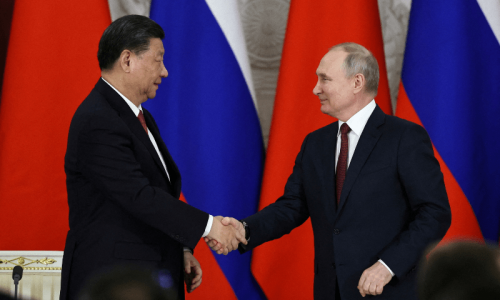KUWAIT CITY: The fall of Iraq’s Saddam Hussein has triggered domestic changes in neighbouring Gulf Arab monarchies but the nature of such changes will depend on how Washington controls the Arab nation, analysts say.
The crushing defeat of the Baathist regime at the hands of US-led forces six months ago undoubtedly came as a major relief for Gulf states but it has also opened the way for much-needed and long-awaited reform.
The US-British victory in Iraq has already triggered “a number of strategic changes, the most important of which is altering the balance of power in the region,” Saudi analyst Anwar Eshki said.
“Gulf states in particular were spending heavily on external security (defence spending),” because of the presence of regional threats mainly from Saddam’s Iraq, he said.
“Now, the focus is on internal security and the economy. Defence spending is decreasing rapidly,” said Eshki, head of the Jeddah-based Middle East Center for Strategic and Legal Studies.
The oil-rich Gulf region had remained one of the most unstable areas of the world for almost three decades mainly due to Saddam Hussein’s military adventures, which included two wars with Iran and the August 1990 invasion of Kuwait and subsequent seven-month occupation.
And US-Iraqi political and military confrontation between 1991 and 2003 caused serious tension in the region and delayed decisive development plans.
“The removal of Saddam Hussein was a real gain for Kuwait and other Gulf countries brought by a foreign power,” Kuwaiti columnist and political analyst Ayed al-Manna said.
The impact of ousting Saddam on Iraq’s neighbours will be “decisive, but its nature will greatly depend on the turn of events in Baghdad. Stability and security in Iraq are a key factor for change in this region,” Manna said.
He believes that if the United States succeeds in establishing democracy in Iraq, Gulf Arab states will undergo major democratization, the signs of which have already started.
But if the security turmoil continues, “Iraq’s neighbours, mainly Gulf Arabs, will be adversely affected, on the economic, political and security fronts,” Manna said.
A major sign of relief in the region is seen in the performance of the Kuwaiti and Saudi bourses which have risen by 83 per cent and 75 per cent respectively since Saddam’s regime collapsed.
All six nations that make up the Gulf Cooperation Council (GCC) are ruled by royal families who have been in power for centuries.
Kuwait, Bahrain and Oman have elected parliaments but Qatar, the United Arab Emirates (UAE) and Saudi Arabia only have appointed councils.
Eshki believes that Gulf states are prepared for change “but not the way the United States is pressing for.”
“These states have started to crackdown on extremists. They are revising school curriculums. There is a tendency for change, openness and dialogue. They are introducing constitutions and reforms,” he said.
Saudi Arabia, the largest state in the Gulf, has launched a campaign against militants in the kingdom after September 11, 2001, but the crackdown intensified after the May 12 suicide attacks in Riyadh which killed 35 people.—AFP











































Dear visitor, the comments section is undergoing an overhaul and will return soon.